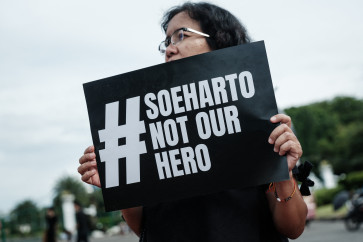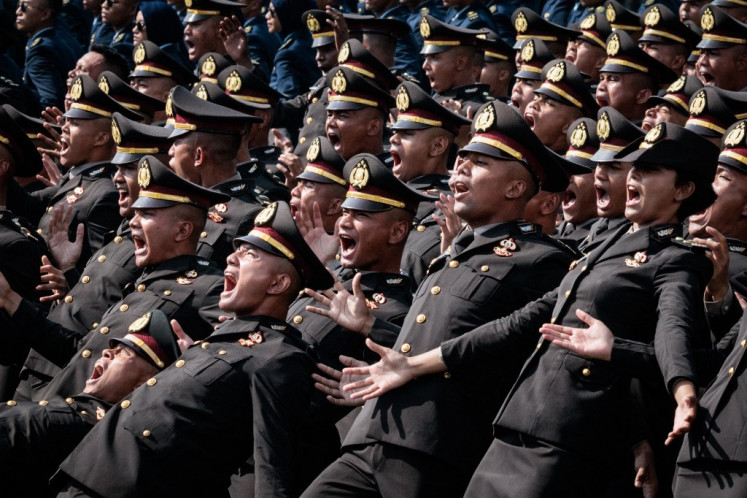Popular Reads
Top Results
Can't find what you're looking for?
View all search resultsPopular Reads
Top Results
Can't find what you're looking for?
View all search resultsSeeking a balance between intelligence and citizen rights
The suicide bombing at the mosque inside the Cirebon Police compound on April 16 again showed the risks and the potential for casualties if intelligence agencies fail to prevent acts of terrorism
Change text size
Gift Premium Articles
to Anyone
T
he suicide bombing at the mosque inside the Cirebon Police compound on April 16 again showed the risks and the potential for casualties if intelligence agencies fail to prevent acts of terrorism.
Worse, the bombing served to mock the capability, or lack thereof, of Indonesia’s intelligence bodies, as it struck a symbol of the nation’s security apparatus.
Undoubtedly, accurate and timely intelligence is vital in both peacetime and wartime. Intelligence bodies serve to provide information on potential threats or adversaries to protect the state and its citizens.
A lack of accurate intelligence will result in a failure to make quick and correct decisions during crises, and, at worst, a failure to discover imminent threats. The CIA was lambasted for its failure to prevent the 9/11 attack in 2001 and its credibility has declined since then.
Possession of accurate intelligence data would help to pre-empt the enemy. Intelligence traditionally operates in two different areas: security intelligence, pertaining to domestic or national security threats, and foreign intelligence, connected to information gathering related to the military, political or economic activities of foreign states.
The first can be defined as the intelligence behind the police’s function, as their main responsibility is to protect the country and its citizens from espionage, terrorism and such.
Although they contribute to law enforcement, they are not necessarily law enforcement officers.
For example, MI-5 in the United Kingdom and the Australian Security Intelligence Organization (ASIO) are neither armed nor have arrest powers. Operations requiring police authority are conducted in coordination with law enforcement.
The second type of intelligence work is done covertly overseas to inform policymakers of national security decisions and actions pertaining to external threats.
In the era of transnational crimes, the traditional boundaries between the two types of intelligence can sometimes be blurred.
There is also a danger of information overload when intelligence cannot be digested in an effective and timely manner. The new situation calls for closer coordination or “unity” between intelligence bodies and the creation of a body to coordinate different intelligence activities to deliver digestible but comprehensive intelligence reports.
Such a coordinating body would be responsible for managing and coordinating the nation’s intelligence agencies and providing advice to the president. It should not have the authority to conduct intelligence operations as that would confusion the division of labor between intelligence bodies.
By comparison, the Joint Intelligence Committee (JIC) in the UK has three functions: to advise the prime minister and Cabinet ministers on intelligence collection and analysis priorities, to direct the collection and analysis of intelligence agencies and to assure the professional standards of the civilian intelligence analysis staff.
Indonesian intelligence services are comprised of different organizations with special tasks, but without a coordinating body. There are military intelligence and security intelligence bodies. Military and combat intelligence falls under Strategic Intelligence Agency (BAIS), units and territorial commands. Security intelligence, namely that intelligence compiled by the National Police and Attorney General’s Office, support judicial decision-making. There is also an intelligence unit working under the customs office.
According to Presidential Decree No. 34/2010, the State Intelligence Agency (BIN) is authorized to conduct intelligence activities and coordinate the work of state intelligence bodies. This ambiguous authority should be ironed out in the current intelligence bill which, regrettably, does not address the issue adequately.
Another worrisome issue is intelligence oversight. In the past, some intelligence agencies were accused of involvement in human rights abuses and illegal actions.
Sadly, such abuse has continued during the reform era as BIN was implicated in the murder of human rights activist Munir.
Recent information released by WikiLeaks showed that Indonesian intelligence agencies were allegedly used to spy on the government’s political foes. If true, this must be seen as alarming indication that intelligence bodies are still susceptible to abuse. This would have never occurred had adequate oversight been in place.
The debate on the balance between intelligence agencies and civil rights has been active in many democratic countries, not just in Indonesia. This is inevitable considering the nature of intelligence gathering, which involves collecting secret information by breaching privacy when needed. However, the danger of intelligence agents running loose without proper oversight is distressing.
The purpose of oversight is to protect the private rights of every citizen. There can never be an absolute and unchecked authority in charge of surveillance activity for the sake of national security. For this purpose, intelligence oversight must be achieved through multiple layers of supervision by the executive, judiciary and legislative bodies.
The executive is solely responsible for control and audit of the intelligence services for transparency and legislative oversight. The minister in charge of intelligence operations receives reports from intelligence agencies and must ensure that they comply with the law.
At the legislative level, a special commission with authority to examine the role, the effective use of resources and the implementation of intelligence policy should be created.
Such a commission must conform to special requirements to safeguard intelligence activities. For example, each member should take a special oath to uphold the secrecy of the intelligence they receive.
Last, judicial oversight is needed to ensure that intelligence activities do not violate the law and the Constitution. Judicial oversight will protect private rights, the acquisition of important information and the following of legal requirements. In addition, it also needs to be prepared for investigations in the event of complaints of improper surveillance.
We need intelligence to safeguard the country and its people, but not at the expense of privacy and life of innocent citizens. The current intelligence bill, sadly, is far from ensuring a balance between the two critical issues. Without significant changes, the bill will only revive the traumatic misuse of intelligence.
Cahyadi Satriya is a researcher at Imparsial, a human rights monitoring group. Curie Maharani is an associate research fellow with the Military Studies Program at the S. Rajaratnam School of International Studies, Singapore.










